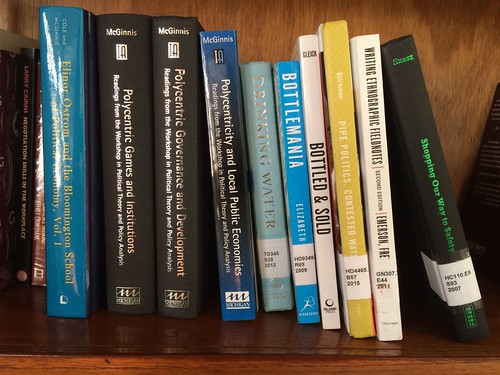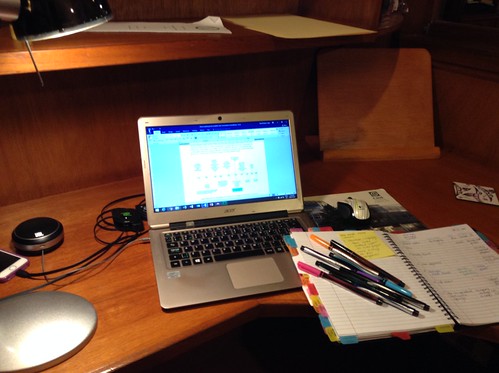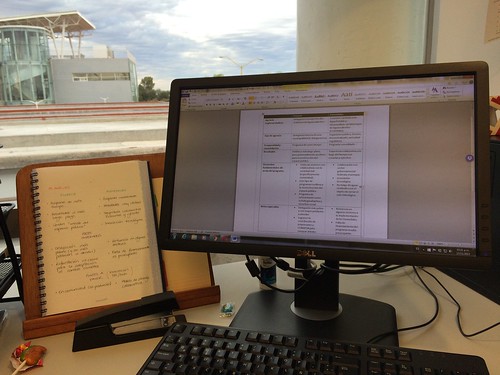A few people have asked me to blog about where or how they can find new ideas for a paper they want to write. I have to say that the primary ways in which I improve my writing (and generate new ideas) is by reading and then writing. On the plane from New Haven to Dallas I thought about what kind of strategies could one use to generate new ideas, and whether or not there is a systematic way to do this. So here are four ways in which I’ve generated ideas in the past few months.
1. Producing an Excel synthetic dump for a topic
The very first way in which I have generated new ideas is by creating an Excel dump for a specific topic. I have synthetic worksheets for bottled water, garbage governance, polycentricity, field experiments, human right to water, etc. I recently wrote a portion of an Excel worksheet on drinking water and bottled water, summarizing the most recent books I had read. From writing that worksheet, I figured out 3 or 4 gaps in the literature that have not been addressed, and the overall direction in which the literature is going.
2. Writing memoranda from newspaper articles
Other ways in which I gain new insights is writing memoranda about newspaper articles. For example, I recently used a long-form article on bottled water to design a historical timeline of how bottled water has grown. This was something I needed to do, something I WANTED to do, but that I had not had the time to think through and systematically follow. Thus, from reading a news article, I got a diagram showing the history of bottled water, and a summary (with quotations) of the news article, plus a few paragraphs discussing whether the historical timeline was accurate.
3. Writing a memorandum about a journal article, book chapter or book.
I usually can relate to topics better when I am writing a memo, usually summarizing a book chapter, journal article, or book I have just been reading. For example, a recent paper by Kate Neville and Erika Weinthal on rescaling as a strategic choice of environmental activists in Canada prompted me to revisit the literature on rescaling, and the different ways in which rescaling occurs. The same article led me to think about framing theory (something I’ve been doing for a while in my study of intractable water conflict), and thus I wrote a few paragraphs on different uses of framing theory (citing Neville and Weinthal, but also Snow, and other authors on framing). Thus, as I was writing a memo on Neville and Weinthal, I ended up writing a few paragraphs of another memo on framing theory, and a few paragraphs on rescaling and different applications. I may or may not use these paragraphs in a new paper, but at least, I put them down “on paper” (although in this case, it was digitally) and thus have them available and systematized.
3 hour nap on flight BDL-DFW, then 2 hour #AcWri session (writing memo on @katejneville 's article with E. Weinthal) pic.twitter.com/M1FkElp7F5
— Dr Raul Pacheco-Vega (@raulpacheco) October 16, 2016
4. Explaining data and analyses through tables and graphs
Another way in which I get new ideas (and thus produce new “generative” writing) that is also related to the previous point is through writing tables or analyzing data and preparing graphs with those data. Creating tables (or graphs) and then having to explain them helps me think through new ideas and concepts. I recently created a table of ethical bottled water companies, and that table itself made me rethink the way in which ethics is discussed within bottled waters. In writing explanations about how I constructed the table, I realized several different components of this research that I hadn’t thought through very well.
These are four ways in which I generate new ideas for papers, or within a specific paper. These techniques help me overcome writers’ block and kickstart my writing. Hopefully they’ll be useful to other people! I am also curious to know which techniques others use to generate new ideas.




My professor just used this as a guide for us to think about how to start our research process in our Research and Methods course..very informative, thank you.
So glad to hear!
Reading through your blogs has really been helpful